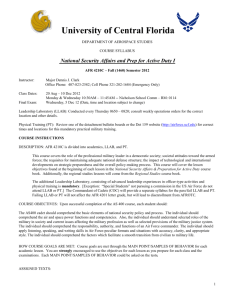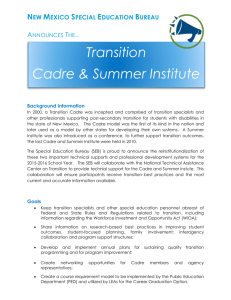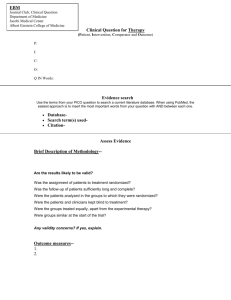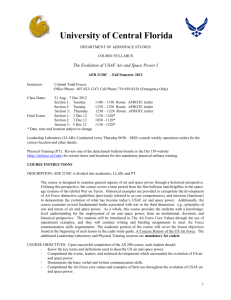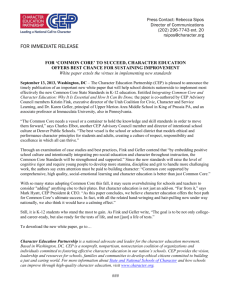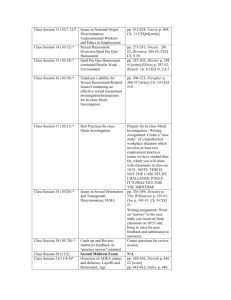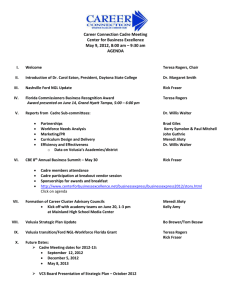course syllabus - UCF AFROTC - University of Central Florida
advertisement
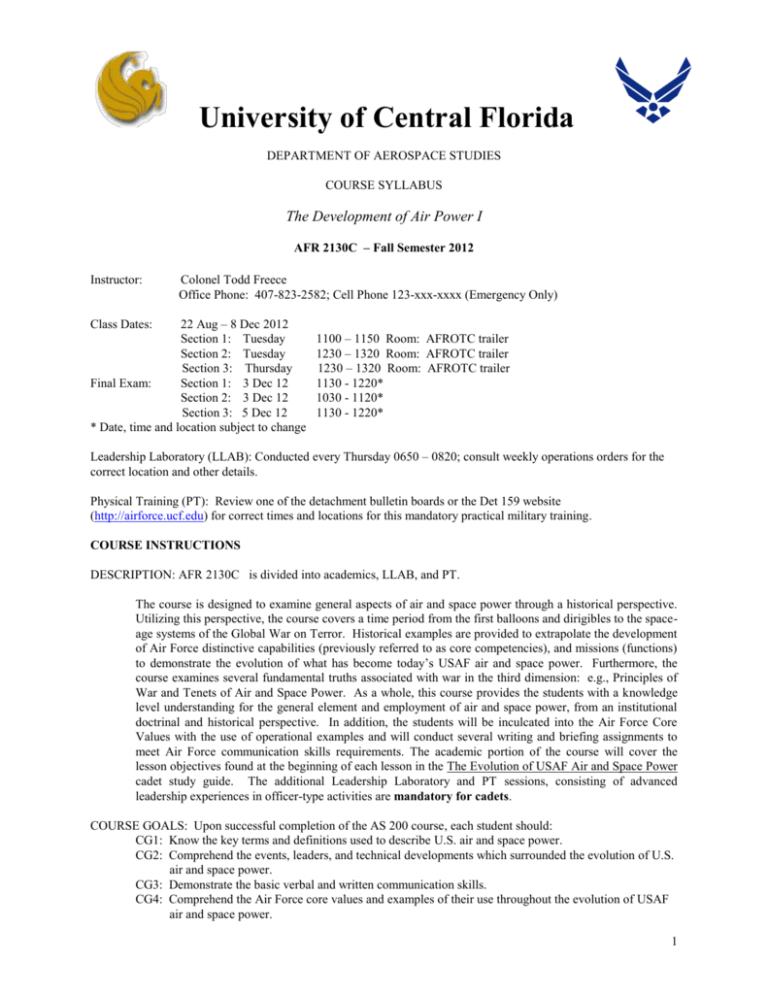
University of Central Florida DEPARTMENT OF AEROSPACE STUDIES COURSE SYLLABUS The Development of Air Power I AFR 2130C – Fall Semester 2012 Instructor: Colonel Todd Freece Office Phone: 407-823-2582; Cell Phone 123-xxx-xxxx (Emergency Only) 22 Aug – 8 Dec 2012 Section 1: Tuesday Section 2: Tuesday Section 3: Thursday Final Exam: Section 1: 3 Dec 12 Section 2: 3 Dec 12 Section 3: 5 Dec 12 * Date, time and location subject to change Class Dates: 1100 – 1150 Room: AFROTC trailer 1230 – 1320 Room: AFROTC trailer 1230 – 1320 Room: AFROTC trailer 1130 - 1220* 1030 - 1120* 1130 - 1220* Leadership Laboratory (LLAB): Conducted every Thursday 0650 – 0820; consult weekly operations orders for the correct location and other details. Physical Training (PT): Review one of the detachment bulletin boards or the Det 159 website (http://airforce.ucf.edu) for correct times and locations for this mandatory practical military training. COURSE INSTRUCTIONS DESCRIPTION: AFR 2130C is divided into academics, LLAB, and PT. The course is designed to examine general aspects of air and space power through a historical perspective. Utilizing this perspective, the course covers a time period from the first balloons and dirigibles to the spaceage systems of the Global War on Terror. Historical examples are provided to extrapolate the development of Air Force distinctive capabilities (previously referred to as core competencies), and missions (functions) to demonstrate the evolution of what has become today’s USAF air and space power. Furthermore, the course examines several fundamental truths associated with war in the third dimension: e.g., Principles of War and Tenets of Air and Space Power. As a whole, this course provides the students with a knowledge level understanding for the general element and employment of air and space power, from an institutional doctrinal and historical perspective. In addition, the students will be inculcated into the Air Force Core Values with the use of operational examples and will conduct several writing and briefing assignments to meet Air Force communication skills requirements. The academic portion of the course will cover the lesson objectives found at the beginning of each lesson in the The Evolution of USAF Air and Space Power cadet study guide. The additional Leadership Laboratory and PT sessions, consisting of advanced leadership experiences in officer-type activities are mandatory for cadets. COURSE GOALS: Upon successful completion of the AS 200 course, each student should: CG1: Know the key terms and definitions used to describe U.S. air and space power. CG2: Comprehend the events, leaders, and technical developments which surrounded the evolution of U.S. air and space power. CG3: Demonstrate the basic verbal and written communication skills. CG4: Comprehend the Air Force core values and examples of their use throughout the evolution of USAF air and space power. 1 HOW COURSE GOALS ARE MET: Course goals are met through the MAIN POINT/SAMPLES OF BEHAVIOR for each academic lesson. You are strongly encouraged to use the objectives for each lesson as you prepare for each class and the examinations. Each MAIN POINT/SAMPLES OF BEHAVIOR could be asked on the tests. Login to http://holmcenter.com/index.php for your materials ASSIGNED TEXTS: T-206 T–213 T-401 The Evolution of USAF Air & Space Power AS200 Student Notetaker (www.airforce.ucf.edu) AFMAN 10-100 READING ASSIGNMENTS: I expect you to complete all required reading assignments PRIOR to each class session in accordance with the attached schedule. I’ll be calling on you randomly to participate in each discussion and may have random quizzes before the class begins. WRITING ASSIGNMENTS: FOLLOW TONGUE & QUILL FORMATS FOR ALL ASSIGNMENTS! (HTTP://WWW.E-PUBLISHING.AF.MIL/SHARED/MEDIA/EPUBS/AFH33-337.PDF) Writing Assignment: Written: 1-page talking paper (pg 209) on an a lesson plan within this term YOU ARE TO WORK ALONE AND USE THE TONGUE AND QUILL AS YOUR GUIDE FOR ALL FORMATTING! DUE TO INSTRUCTOR BY THE 4 CLASS PERIOD, LATE PAPERS WILL DROP A GRADE PER WEEK. TH Briefing Assignment: Oral: 3-5 minute briefing on an your written assignment YOU ARE TO WORK ALONE AND USE THE TONGUE AND QUILL AS YOUR GUIDE FOR ALL FORMATTING! DUE BY END OF COURSE, FAILURE TO BRIEF IS A ZERO! Fall Term: LISTENING ASSIGNMENTS: Listening is a critical skill you’ll need to succeed in your future profession as an Air Force officer. To encourage you to actively develop the mental skills necessary for effective listening, I may give unannounced quizzes based on a discussion we’ve just completed or a previous lesson. I reserve the right to measure your listening competency in other ways. INSTRUCTOR OFFICE HOURS: My normal office hours are between 0900 - 1600 hours Monday through Friday. However, you must make an appointment with me to minimize your waiting time (Office Phone: 823-1247), email address is Todd.Freece@ucf.edu INSTRUCTIONAL METHODS: I will use the following methods of instruction: Lecture by Instructor Guided Discussion Student Presentation Student-led Discussion Written Assignments Examinations Guest Speakers/Lecturers Videos, slides, movies CLASSROOM ACTIVITIES: Classroom sessions will focus on the assigned readings and selected outside sources. I expect each student to come to class prepared. This means you've read your assignment and have completed any other assigned work. CLASS CONDUCT: You will be expected to carry yourself in a professional manner at all times during this class. With respect to that, the following guidelines apply: No food or drink is allowed, with the exception of water/drink in a sealable bottle. Punctuality is important and expected. Entering class after the room has been called to attention to mark the start of class will result in you being marked tardy. The first time will constitute a verbal warning, each subsequent time will result in a Form 16. You are responsible for properly wearing the uniform and meeting the required grooming and fitness standards. There are Air Force and AFROTC instructions, as well as, the Cadet Guide which cover the necessary specifics for these areas. You must also keep your behavior in line with your status as an 2 AFROTC cadet. Your peers, fellow students, and community members are watching you. They should see evidence of an individual with respect for self, others, Air Force, and country. CLASS ATTENDANCE: According to AFROTCI 36-2010, para 1.1.1.1, “Cadets must attend 80 percent of Aerospace Studies (AS) classes.” If you fall below 80 percent you will automatically fail the course. This attendance policy also applies to “academic only” students. GRADE DETERMINATION: The grading system is as follows: IAW AFROTCI 36-2011, para 4.33.4.1, “Cadets must receive a grade of “C-“ or better in AS classes and LLAB. When the cadet receives a grade of “D” or “F” in AS class or LLAB, the cadet must be investigated for disenrollment (contract cadets) or dismissed from the program (non-contract cadets).” Grading and Evaluation Procedures: Subject: % Of Course Grade Pts Available Midterm Examination 33% 20 Final Examination 33% 20 Memo Writing Assignment 7% 20 Talking Paper Writing Assignment 7% 20 Class Participation/Quizzes 20% 20 Total Pts: 100 Grading Scale: Grade A AB+ B BC+ Points 94-100 90-93 87-89 84-86 80-83 77-79 GPA 4.00 3.75 3.25 3.00 2.75 2.25 Grade C CD+ D DF Points 74-76 70-73 67-69 64-66 60-63 0-59 GPA 2.00 1.75 1.25 1.00 0.75 0.00 TERM REVIEW: In accordance with AFROTCI 36-2011, we’re required to counsel you each academic term and complete it not later than the semester halfway point. I will review your files using AFROTC Form 16. I will provide you with a sign-up schedule, completed Form 48, (transcript for cross-town cadets) is required! I EXPECT YOU TO KEEP THIS APPOINTMENT! Make sure you follow proper reporting procedures when you arrive for this appointment. Uniform is required for this appointment. UNIFORM OF THE DAY: All cadets should refer to the current operations order for the correct uniform to wear. FIELD TRAINING: You should all be preparing for field training this upcoming summer. As such, there will be several items you will need to have completed before PSP Board Cut-Off which occurs in late February. I will be tracking these items. While I am tracking these items, IT IS YOUR RESPONSIBILITY TO ENSURE EACH OF THESE ITEMS IS ACCOMPLISHED. I will not baby sit you for these items. If you fail to provide these items to us, you may ultimately not get a slot to attend field training during Summer 12 and could be eliminated from AFROTC training. (For example, keep track of your accomplishments, function participation, etc.) LESSON SLIDES: The slides from each weekly lesson will be posted on Webcouses@UCF (https://webcourses.ucf.edu/webct/entryPage.dowebct) and the cadet web site (http://airforce.ucf.edu). These will serve as good study material for exam preparation. TODD FREECE, COLONEL, USAF Professor of Aerospace Studies AFR 2130C Instructor 3 AFR 2130C Spring 2012 SYLLABUS CLASS SCHEDULE DATE CLS TOPIC 20 Aug/ 22 Aug 27 Aug/ 29 Aug 3 Sep/ 5 Sep 10 Sep/ 12 Sep 17 Sep/ 19 Sep 24 Sep/ 26 Sep 1 Oct/ 3 Oct 8 Oct/ 10 Oct 15 Oct/ 17 Oct 1 Introduction/Administration Communication Assignments MODULE I: Air Power Thro ugh WWI: Air and Space Power Defmed (Chap 1) Early Flight to World War I (Chap 2) TALKING PAPERS DUE! Advent of the Air Age: World War I (Chap3) MODULE II: The Interwar Years The Deve.lopment of Air Doctrine (Chap 4) Air Power in Early World War II (Chap 5) 22 Oct/ 24 Oct 29 Oct/ 31 Oct 5 Nov/ 7 Nov 10 12 Nov/ 14 Nov 19 Nov/ 21 Nov 26 Nov/ 28 Nov 3 Dec/ 5 Dec 10 Dec 2 COURSE GOALS INSTRUCTOR Cadre CG1, CG3, CG4 CG2, CG3, CG4 CG2, CG3, CG4 CG2, CG3, CG4 CG2, CG3, CG4 CG2, CG3, CG4 Cadre MODULE III: Airpower Through Cold War An Independent Air Force & The Cold War (Chap 8) The Berlin Airlift (Chap 9) Lemay and Nuclear Deterrence (Chap 10) The Korean War Part I (Chap 11) The Korean War Part II (Chap 12) The Cuban Missile Crisis: Air and Space Power Revisited (Chap 13) CG2, CG3, CG4 Cadre CG2, CG3, CG4 CG2, CG3, CG4 CG2, CG3, CG4 Cadre 13 Briefings and Finals Review Cadre 14 No Classes- Thanksgiving Break "HAPPY THANKSGIVING" Finals Review /Final Examination CG2, CG3, CG4 CG2, CG3, CG4 CG3 3 4 5 6 7 8 9 11 12 15 The European Theater in WWII (Chap 6) The Pacific Theater in WWII (Chap 7) Midterm Examination Cadre Cadre Cadre Cadre Cadre Cadre Cadre Cadre Cadre 16 4
